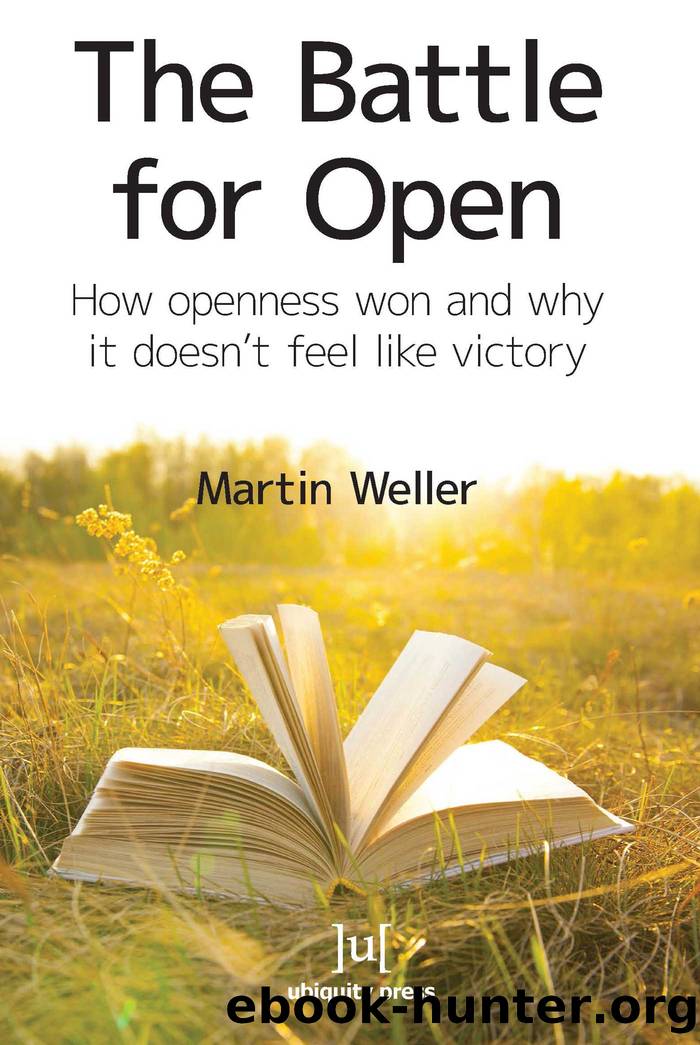The Battle for Open: How openness won and why it doesn't feel like victory by Martin Weller

Author:Martin Weller [Weller, Martin]
Language: eng
Format: epub
ISBN: 9781909188341
Publisher: Ubiquity Press
Published: 2014-12-11T00:00:00+00:00
All of these requirements have financial implications beyond the current content focus (which is subsidised by the very universities that MOOCs are supposed to replace). Inevitably, MOOCs as universal education method would soon begin to cost more and more. They may be cheaper than the existing model, which would be dramatic, but they would soon cease to be free or open.
It is not the focus of this book to explore various funding models for higher education, but the âeducation is brokenâ argument is rarely stated as âfunding for education is brokenâ, and if the debate that society needs to have is about how to fund higher education, then that should be the focus rather than a proxy argument around broken education and alternative models.
The argument is too simplistic and just lazy; as with the truancy case, there are a number of factors that would need exploring for an effective solution. But there is also a more manipulative intention to it, which relates to the language of change and how it shapes our responses. If something is diagnosed as broken, then the appropriate response is to fix it. The search then becomes for a solution, and very often those people who are determining education to be broken also stand to profit from providing an alternative solution. For instance, the authors of the âAvalancheâ report in the UK all work for the education publisher and courseware provider Pearson. Both DâSouza and Thrun, quoted above, were CEOs of companies that seek to offer a solution to the problem of broken education. There is even an education Âstart-Âup (degreed.com) that ran a campaign with the slogan âEducation is broken. Someone should do something.â That someone being them, naturally.
Caulfield (2012) highlights the difference between a rhetoric of opportunity and a rhetoric of crisis. This difference in language is Âsignificant for framing our response. Thibodeau and Boroditsky found that the metaphors used to frame a problem influenced the solution that subjects proposed, so whether crime was couched in terms of a Âvirus- or a Âbeast-Âlike metaphor, would shape how people thought it should be handled. A rhetoric of opportunity might suggest encouraging those already working in the sector to take advantage of opportunities and work with others. A rhetoric of crisis suggests that the incumbents cannot be trusted and that external agents are required to make sweeping changes.
Education is broken; it therefore requires fixing, and MOOCs provide the radical solution required. This was the simplistic logic that underpinned many of the early MOOC articles. It is easy to see how MOOCs can be posited as a solution to the nebulous problem of broken Âeducation â Âthey are free, online, and infinitely scalable. The same could be said of OERs also, so why do MOOCs appeal to this rhetoric of crisis in a way that other open education movements have not? The reasons relate to the second dominant narrative that they have sympathy with, namely that of Silicon Valley.
Download
This site does not store any files on its server. We only index and link to content provided by other sites. Please contact the content providers to delete copyright contents if any and email us, we'll remove relevant links or contents immediately.
Spare by Prince Harry The Duke of Sussex(5173)
Navigation and Map Reading by K Andrew(5150)
Tuesdays with Morrie by Mitch Albom(4767)
Machine Learning at Scale with H2O by Gregory Keys | David Whiting(4290)
Cracking the GRE Premium Edition with 6 Practice Tests, 2015 (Graduate School Test Preparation) by Princeton Review(4271)
Never by Ken Follett(3931)
Goodbye Paradise(3797)
What It Really Takes to Get Into Ivy League and Other Highly Selective Colleges by Hughes Chuck(3742)
Fairy Tale by Stephen King(3367)
Harry Potter and the Prisoner of Azkaban (Book 3) by J. K. Rowling(3346)
Pledged by Alexandra Robbins(3170)
Kick Ass in College: Highest Rated "How to Study in College" Book | 77 Ninja Study Skills Tips and Career Strategies | Motivational for College Students: A Guerrilla Guide to College Success by Fox Gunnar(3113)
Reminders of Him: A Novel by Colleen Hoover(3075)
A Dictionary of Sociology by Unknown(3070)
Sapiens and Homo Deus by Yuval Noah Harari(3061)
The Social Psychology of Inequality by Unknown(3014)
Graduate Admissions Essays, Fourth Edition: Write Your Way into the Graduate School of Your Choice (Graduate Admissions Essays: Write Your Way Into the) by Asher Donald(2906)
Will by Will Smith(2904)
Zero to Make by David Lang(2776)
